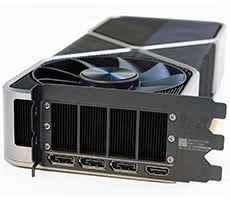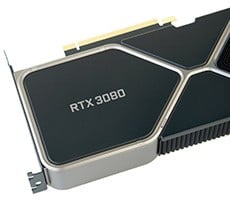|
390 million transistors on 65nm fabrication process
128-bit DDR2/GDDR3/GDDR4 memory interface
Ring Bus Memory Controller
-Fully distributed design with 256-bit internal ring bus for memory reads and writes
Unified Superscalar Shader Architecture
-120 stream processing units
-Dynamic load balancing and resource allocation for vertex, geometry, and pixel shaders
-Common instruction set and texture unit access supported for all types of shaders
-Dedicated branch execution units and texture address processors
-128-bit floating point precision for all operations
-Command processor for reduced CPU overhead
-Shader instruction and constant caches
-Up to 40 texture fetches per clock cycle
-Up to 128 textures per pixel
-Fully associative multi-level texture cache design
-DXTC and 3Dc+ texture compression
-High resolution texture support (up to 8192 x 8192)
-Fully associative texture Z/stencil cache designs
-Double-sided hierarchical Z/stencil buffer
-Early Z test, Re-Z, Z Range optimization, and Fast Z Clear
-Lossless Z & stencil compression (up to 128:1)
-Lossless color compression (up to 8:1)
-8 render targets (MRTs) with anti-aliasing support
-Physics processing support
Full support for Microsoft® DirectX® 10.0
-Shader Model 4.0
-Geometry Shaders
-Stream Output
-Integer and Bitwise Operations
-Alpha to Coverage
-Constant Buffers
-State Objects
-Texture Arrays
Dynamic Geometry Acceleration
-High performance vertex cache
-Programmable tessellation unit
-Accelerated geometry shader path for geometry amplification
-Memory read/write cache for improved stream output performance
Anti-aliasing features
-Multi-sample anti-aliasing (up to 8 samples per pixel)
-Up to 24x Custom Filter Anti-Aliasing (CFAA) for improved quality
-Adaptive super-sampling and multi-sampling
-Temporal anti-aliasing
-Gamma correct
-Super AA (CrossFire configurations only)
-All anti-aliasing features compatible with HDR rendering
CrossFire™ Multi-GPU Technology
-Scale up rendering performance and image quality with 2 or more GPUs
-Integrated compositing engine
-High performance dual channel interconnect
|
Texture filtering features
-2x/4x/8x/16x high quality adaptive anisotropic filtering modes (up to 128 taps per pixel)
-128-bit floating point HDR texture filtering
-Bicubic filtering
-sRGB filtering (gamma/degamma)
-Percentage Closer Filtering (PCF)
-Depth & stencil texture (DST) format support
-Shared exponent HDR (RGBE 9:9:9:5) texture format support
ATI Avivo™ HD Video and Display Platform
-Dedicated unified video decoder (UVD) for -H.264/AVC and VC-1 video formats
-High definition (HD) playback of both Blu-ray and HD DVD formats
-Hardware MPEG-1, MPEG-2, MPEG-4/DivX video decode acceleration
-Motion compensation and iDCT (inverse discrete cosine transform)
-Avivo Video Post Processor
-Color space conversion
-Chroma subsampling format conversion
-Horizontal and vertical scaling
-Gamma correction
-High Quality Video Post Processing
-Advanced vector adaptive per-pixel de-interlacing
-De-blocking and noise reduction filtering
-Detail enhancement
-Inverse telecine (2:2 and 3:2 pull-down correction)
-Bad edit correction
-Two independent display controllers
-Drive two displays simultaneously with independent resolutions, refresh rates, color controls and video overlays for each display
-Full 30-bit display processing
-Programmable piecewise linear gamma correction, color correction, and color space conversion
-Spatial/temporal dithering provides 30-bit color quality on 24-bit and 18-bit displays
-High quality pre- and post-scaling engines, with underscan support for all display outputs
-Content-adaptive de-flicker filtering for interlaced displays
-Fast, glitch-free mode switching
-Hardware cursor
-Two integrated dual-link DVI display outputs
-Each supports 18-, 24-, and 30-bit digital displays at all resolutions up to 1920x1200 (single-link DVI) or 2560x1600 (dual-link DVI)1
-Each includes a dual-link HDCP encoder with on-chip key storage for high resolution playback of protected content2
-Two integrated 400 MHz 30-bit RAMDACs
-Each supports analog displays connected by VGA at all resolutions up to 2048x15361
-HDMI output support
-Supports all display resolutions up to 1920x10801
-Integrated HD audio controller with multi-channel (5.1) AC3 support, enabling a plug-and-play cable-less audio solution
Integrated AMD Xilleon™ HDTV encoder
-Provides high quality analog TV output (component/S-video/composite)
-Supports SDTV and HDTV resolutions
-Underscan and overscan compensation
-MPEG-2, MPEG-4, DivX, WMV9, VC-1, and H.264/AVC encoding and transcoding
-Seamless integration of pixel shaders with video in real time
-VGA mode support on all display outputs
PCI Express x16 bus interface
OpenGL 2.0 support
|






